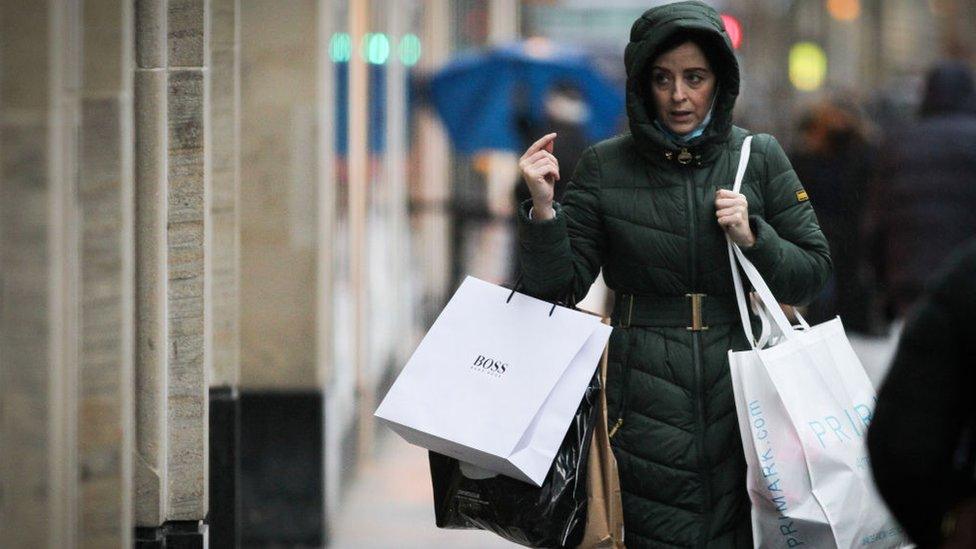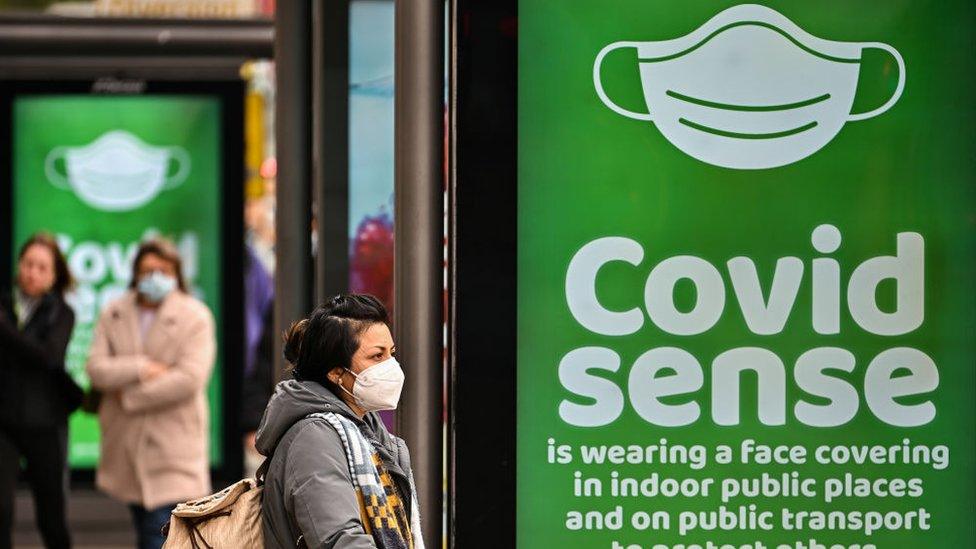Covid in Scotland: 'All options on table' for post-Christmas rules
- Published
- comments

A decision on whether stricter measures should be imposed after 27 December will be taken on Tuesday
Scotland's health secretary has said all options remain on the table for Covid lockdown rules after the five-day Christmas easing period ends.
There has been speculation that some areas of the country could have tighter restrictions imposed after 27 December.
Jeane Freeman said nothing could be "sensibly ruled out" at this stage - with a decision due on Tuesday.
She was speaking as three council areas prepared to move to a higher level of restrictions.
Aberdeen, Aberdeenshire and East Lothian will all move from level two to level three of Scotland's five-tiered system, external from 18:00 on Friday.
It means they will face stricter rules on movement, leisure and hospitality.
The changes were announced on Tuesday, with the country's other 29 council areas remaining in their current levels.
The move to level three means 500,000 people across the three areas will no longer be allowed to travel outside their own local authority boundaries unless it is classed as essential.
Pubs, cafes and restaurants will have to completely stop serving alcohol, and must shut at 18:00.
Indoor entertainment venues such as cinemas, bingo halls and amusement arcades will also have to close, and indoor exercise, including gyms, will be restricted to individual workouts.

Aberdeen City, Aberdeenshire and East Lothian join 18 other councils in level three, meaning 80% of Scotland's population will now be under the level three restrictions.
The Scottish Licensed Traders Association has warned that continual uncertainty over the levels was "hugely unfair" on businesses which were being expected to "switch on and off like a tap".
It added: "It's not just a case of opening the doors - premises have to order supplies and organise staff rotas. Many have already taken the decision to remain closed until 2021 because of this uncertainty."
Will there be another lockdown after Christmas?
The Scottish government is considering whether tougher lockdown rules should be imposed when the five-day Christmas easing period ends on 27 December.
Cases of the virus are already increasing in some parts of the country, and are widely expected to spike in the new year as a result of the relaxed festive rules.
Northern Ireland has already announced a new six-week lockdown from 26 December - while Wales will lockdown from 28 December, with reviews being carried every three weeks.
Prime Minister Boris Johnson has said he is "hoping to avoid" another national lockdown in England but has admitted that Covid cases have already increased "very much" in recent weeks.
Ms Freeman told the Scottish government's daily coronavirus briefing on Friday that the situation was currently better in Scotland, where she said hospitals were not under the same pressure as some other parts of the country.

Pubs and other licensed premises in level three areas are not allowed to serve alcohol
Ministers have previously said there will be no change to the current five-day period of more relaxed restrictions next week.
But Ms Freeman said "all options" were still on the table after that, with a decision due to be announced on Tuesday.
She added: "I completely appreciate that everyone would love to know today what next week is going to be like.
"But it is not possible in the way that this virus operates, and the importance of looking really closely and carefully at the information we have and then using that to reach the best judgements we can make, for us to be able to do that at this point."
Prof James Chalmers, of the University of Dundee, told the BBC's Good Morning Scotland he believed the Scottish government should have "reversed" the decision to relax measures over Christmas - and that Scotland was "on course" for another national lockdown.
He said: "I think if we continue on the current course that we have high levels of cases across the UK and Scotland and then we have a relaxation over Christmas, we're looking at a spike in cases in early January.
"The only way we've seen over the last year to control a big spike is to have national lockdowns so I think we're heading in the direction of a lockdown unless there's a change in policy."
New analysis released on Thursday suggested that the R number - effectively the rate at which the virus is spreading in Scotland - was now between 0.9 and 1.1.
This was an increase from the previous week's report, which estimated R to be between 0.7 and 0.9.
Meanwhile, NHS Borders has also warned that a rise in cases meant the region's infection rates are "no longer consistent" with level one restrictions.


- Published1 July 2022
